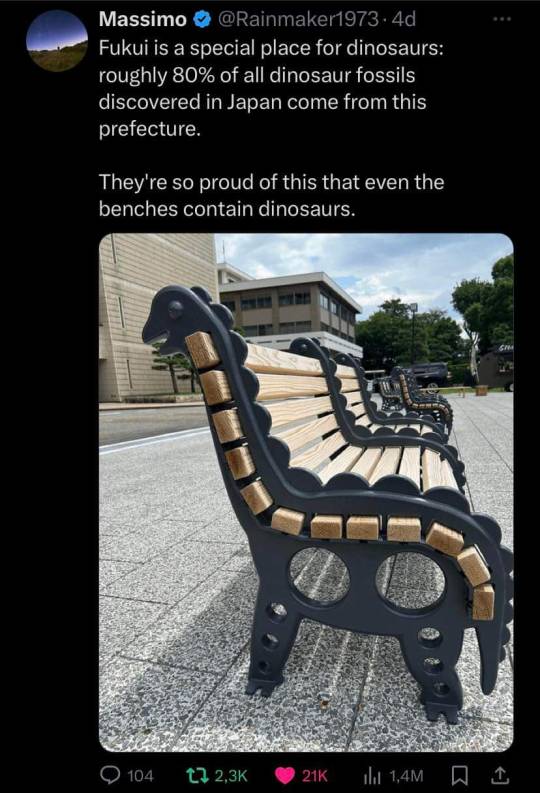Don't wanna be here? Send us removal request.
Text
The Tight 90
(This is a continuation or a fractal reviewing of what I've written about in The Worksheet Manifesto and The Quickstart, The Home Game.)
THE TIGHT 90 is a 90-minute RPG session. It riffs on the perfect length/density of a movie, and I think it's a term I learned/stole from will jobst.
WHY RUN SHORT GAMES?
Short games are easier to fit in a schedule. (We're all so fucking busy.)
Short games are easier to pay attention to. (We're all so fucking mentally ill.)
Short games focus on the good stuff and discard the bad stuff. (We're all so fucking tired.)
HOW RUN SHORT GAMES?
Tell everyone, "We're only going to play for 90 minutes. Because of that, I'm going to focus on the things that are most interesting and exciting for everyone at table, and I'm going to skip over everything else. I would appreciate it if you would do the same. If there's something you're really excited to do, tell the table! And if things are dragging, offer an alternative that moves the game along."
But then we actually have to do that. :( How?
SET SCENES AND STAKES
Don't start in a place where nothing is happening and ask your players "What do you?" Give them something to latch onto! Give them an immediate problem! Here are the first four pages of an issue of Uncanny X-Men by Chris Claremont, Dave Cockrum, et al:
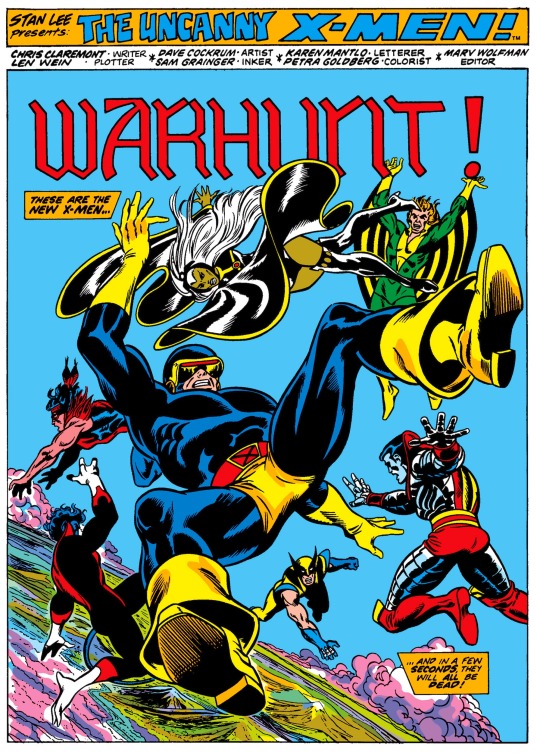

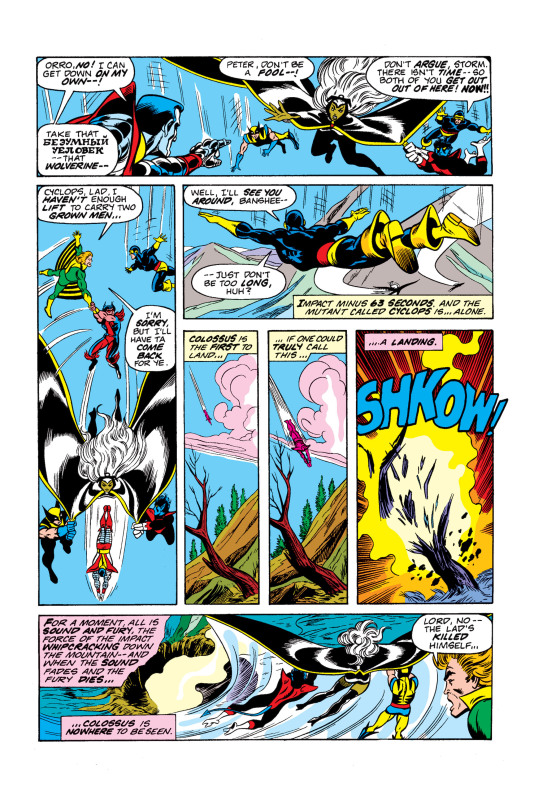

In four pages we get a fatal problem, introductions, flashbacks on how they got here, and spotlights on everyone's powers. Awesome!
And while you don't have to have your players' characters falling out of the sky, at least start them at the dungeon entrance with a couple clear things to DO.
(For more on setting scenes and stakes, check out Primetime Adventures by Matt Wilson, which Sam Dunnewold was kind enough to run for me.)
Of course, if they're falling out of the sky or standing at a foreboding dungeon entrance, some player is bound to ask, "What do I have with me?" To which I say:
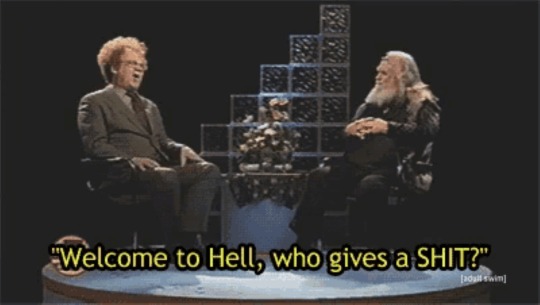
CUT THE BORING SHIT
Shopping? Don't do it! If someone would logically have something, they can have it. And if they try to exploit that, they're no fun to play with! Tell them no. (More on that later.)
Conversations on meandering horseback? Don't do it! Comic writer Chuck Dixon said that if Batman and Robin needed to have a heart-to-heart, they should never just stand around talking. They should have a heart-to-heart while training on top of a speeding train.
(The example was actually Nightwing and Robin, but I didn't want people to click away and look up who Nightwing was. Also, Dixon is a shitty guy! But at least in this, he was right.)
Basically, almost anything you can get out of a shopping scene or a campfire chat, you can get from everyone falling out of the sky or trying to escape a wildfire. ALL SCENES SHOULD PULL DOUBLE DUTY AS PLOT AND CHARACTER DEVELOPMENT.
BE GENEROUS WITH INFORMATION
Imagine a scene at a gaming table. The characters walk into a house in an empty town and ask what they see. The GM tells them to roll perception. The highest result is middling at best. The GM says, "You think you can see some blood." Someone else asks if they can roll investigation. They get a middle high result. The GM says, "There are some bullet casings on the floor and claw marks on the walls." Are the claw marks big? Roll perception again. Do they look like any local animals? Roll nature.
THIS SHIT SUCKS. It's a way to take 30 minutes to poorly tell the players that something interesting happened, and it doesn't give them anything to do after.
Instead, try this: the walls are splattered with blood and empty shell casings lie cold on the floor. The blood doesn't line up with what you know about bullet wounds, though; it lines up with the huge claw marks that tear the walls and floor. And blood drops continue in a line outside...
AND THEN if a player has a cool ability or is an investigator or druid or whatever, you get to write them a cool note that says, "These claw marks are bigger than any animal from around here. Maybe bigger than any animal you've ever seen."
Other examples:
The prince says he doesn't feel threatened by the king. He's clearly lying.
Moving stealthily, you make it to the general's bedroom, but it's clear that he has some sort of sensors or security system set up there.
As a wizard, you know they're casting some sort of summoning spell, and if at least half of the cultists aren't hurt or incapacitated in five minutes, the spell will succeed.
GIVE THE SESSION AN ENDING
It could be an exciting cliffhanger if you think everyone will be there next session to pick it up. But if you're not sure, end with a calm moment where the players have a clear next step. That way you can start next session with, "Last time you'd promised the Cult of Mirrors that you would lead them in war against the Skeleton Army. They're ready to go and ask you what your plan is."
FURTHER HOMEWORK
"How To End Things" by Jason Morningstar. On cutting scenes. Don't be fooled by the Patron link; it's free.
"Grand Experiments: West Marches" by Ben Robbins. The ur-text of running player-motivated sessions that don't require everyone to be there.
BUT WHAT IF!!!
What if rolling investigation rolls are vital to building tension in my mystery game? What if knowing the exact inventory and distance are vital to my high-stress dungeon game? What if campfire stories are my favorite part of our cozy travel game?
COOL! There are lots of resources out there for you, so this isn't for you. But maybe I could tempt you into considering a different style of game sometimes?
(Special thanks to @ladytabletop for supporting my Tight 90 obsession.)
380 notes
·
View notes
Photo
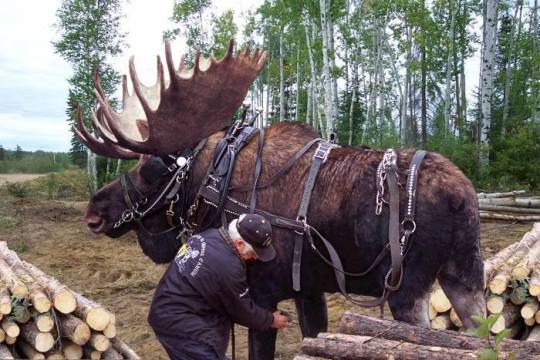
This guy raised an abandoned moose calf with his Horses, and believe it or not, he has trained it for lumber removal and other hauling tasks. Given the 2,000 pounds of robust muscle, and the splayed, grippy hooves, he claims it is the best work animal he has. He says the secret to keeping the moose around is a sweet salt lick, although, during the rut he disappears for a couple of weeks, but always comes home…. Impressive !! MINNESOTA CLYDESDALE
193K notes
·
View notes
Text
So I tabled Cosmic Con recently and it was… pretty dead. Dead enough that my buddy who does a little local con photojournalism messaged to ask What The Fuck He Just Saw Happen after. But it got me and the other artists talking about what makes a good show for artists. I came home to bluesky also being on this topic, and about how a lot of artists alley tabling had changed into a more polished, IP driven experience than the days where a scrappy newcomer could do better. So I’m gonna paraphrase my thread about it here for folks, it may be helpful.
A big part of the bluesky convo hit all the notes you get whenever artists have complaints about the convention scene; the attendees don't seem like they care, other artists production values make an arms race out of table merch, tables are too expensive ever since quarantine, the other tables that were there marketing unrelated products eat up space and bandwith and act obnoxious, and wouldn't it be nice if there was a show that was all Just Artists Alley? From talking to other folks that were there and my own prior experience, I think I've reached an unpopular conclusion; all of these problems (high production values/lack of tabling "scrappiness", expensive tables, no customers and irritating unrelated businesses) are related, and solving them basically means that your comics show CAN'T be all Just Artists Alley. Or at least, it can't while it's small and growing. I can't speak to anyone else's locale, but as someone whose convention scene is MOSTLY locked to NYC I can tell you a lot of the small scrappy cons and zinefests went bye-bye after covid. The convention industry already runs on shoestring budgets and entrepreneurial weirdness, it's not surprising a bunch tanked, and the survivors of this comics K-pg extinction event have had many more artists competing for much fewer tables, allowing them to jack up tabling prices from $150 to a whopping $300 to $500. There's also been a proliferation of new small shows cropping up to fill these now open niches; cons are kind of like restaurants in that a lot of Goofy Goobers assume they know how to run one because they've been to a few of them.
Either way, the con has to sustain itself, either on table prices or ticket sales. If it does it by table prices, then
1) artists are incentivised to compete on polish and quality, which drives up the cost and production value for zines/merch even further and
2) it doesnt have as much reason to actually draw in attendees that then buy merch
A small con can keep itself pretty low rent, on paper all you really need is tables, chairs and a public space. $300 a pop for 20-something artists slots is more than enough to rent out some card tables and a room at the rec center, turn a tidy profit, and not have to attract even a single attendee.
It's not all bleakness out there because there ARE shows I've seen continue to turn a tidy profit. MOCCAfest, every year I can get in, makes me Rent Money explicitly because they already have a reputation with the local arts community; they're guaranteed attendees who care about you, the artists, and the available panels and announcements. But that's built on the back of 24 years of work and exposure. SPX and RICE have similar reputations as major comics hubs. But if you're a newer pop-culture related show, and you don't already have a reputation for excellence in the arts, you need to have more to offer attendees. You need spectacle, entertainment. Something that justifies the value of the ticket prices beyond admission to a flea market.
I attended Brooklyn Comic Con last year and I was blown away by the size of the crowds, as well as the sheer tonnage of relatively unknown artists who were making money hand over fist. Next to nobody was selling IP merch because nobody had to, it was nearly all originals and personal projects. The branded/product booths were all kept at one corner of the show where they wouldn't compete with artists alley, and in the middle of the hall was a wrestling ring where a local indie league was doing a performance, not far from a video game tourney and small gameshow-y performance. The line to get in went around the block.
The most successful cons for artists and organizers alike have been ones where attendees get more for the ticket price than a row of tables to shop at. Indie wrestling leagues like the above have been a big draw, I hear some other shows have been doing it too, but I bet you could get bands and larp groups as well. Big Apple Comiccon has long been home the home of a jedi stagefighting-larp group that does free swordsmanship demos. Brooklyn con was probably one of the busiest new cons I've seen in an age and MOST of the tabling artists were scrappy weirdos, because 40 feet away there was a wrestling ring and drink stands where you could get a kentucky mule and watch two large former theater kids try to kill each other.
Going back to the earlier notes about zinefest scrappiness and production values, table pricing going up means that it's a lot more important for artists to be able to sell at these events. Which drives up the amount they're willing to spend on merch to compete and catch attention, which ALSO drives up the cost of tabling even more. This one's kind of a no-brainer, right? If you can't make money at the show, that limits who can afford to exhibit. Conventions go from being part of an artists livelihood to an advertising drain on their business, making it harder and harder for artists from poorer backgrounds to exhibit their work. But at Brooklyncon? I saw home-silkscreened shirts, experimental cassette tapes, and hand printed zines like I aint seen since the 2010s, flying off of folks tables. If you want to keep that scrappy, everyone's welcome, everyone can make art vibe to your comic shows, either table costs have to go down so it's less of an investment or attendance has to go up so that you're more likely to get that money back. And if shows aren't willing to lower their table price, then you need to REALLY scrutinize what they're doing to make sure YOU will have access to an actually valuable audience who will provide the resources for you to make more art.
Tl:dr version: if you want the vibe to switch to be more in favor of low rent indie tabling, you need shows that put more into drawing large attendances, and that means artists alley CANT be the only thing going on. you should be looking at who organizers are marketing it to, you or the attendee, and keep looking elsewhere if the answer is "you". You're talent, not a customer. Keep that in mind when determining what tables you'll pay for and what the show can offer you.
16 notes
·
View notes
Text
Today on RTFM, the RPG book club podcast, we cover the Possible Worlds series by Tyler Crumrine, six discreet games boxed together. We have them fight to the death until only the best emerges victorious. Just kidding, we loved them all.


31 notes
·
View notes
Text
Kim Kitsuragi is a fascinating character because there's not that much fun or interesting or compelling about him. And yet somehow over the course of playing Disco Elysium the game rewires your fucking brain around him. He's the middest man you've ever seen in both appearance and personality but at some point he says something kind to you or something critical of you and you feel like you just got hit by a truck and you need his approval like you need oxygen and like how tf did this happen. what are you
8K notes
·
View notes
Text
robot mecha anime that is almost entirely about all the hundreds of mechanics and engineers that make the mech possible. the actual mech is only ever shown in parts in the bay or as a blip on a radar. the whole this is shot in a way that makes the machine as eldritch and incomprehensible as the monsters it is fighting. maybe it’s set before digital video so all glimpses of it in action are bad angles on terrible analogue monitors. such that you never even really lock down how its anatomy works. the pilot can be there and be important, but like it’s like a weird eldritch horror take on office politics.
7K notes
·
View notes
Text
Remember the capitalist equation: if someone is paying you $X to do a job, they expect to gain at least $X+1 from your labor
0 notes
Text
Shoppers is literally 5 mini games centered around a shopping mall.
I'm at the point where I have pendulumed away from my love for a quick and easy central mechanic and toward games that are 6-10 interlocking minigames in a trenchcoat.
Going for baroque.
53 notes
·
View notes
Text
The two kung fu queens of Chinese Douyin (Tik Tok) Han Liang and Ling Yun in deadly battle 😉🔥🥰
9K notes
·
View notes
Text
9K notes
·
View notes
Text
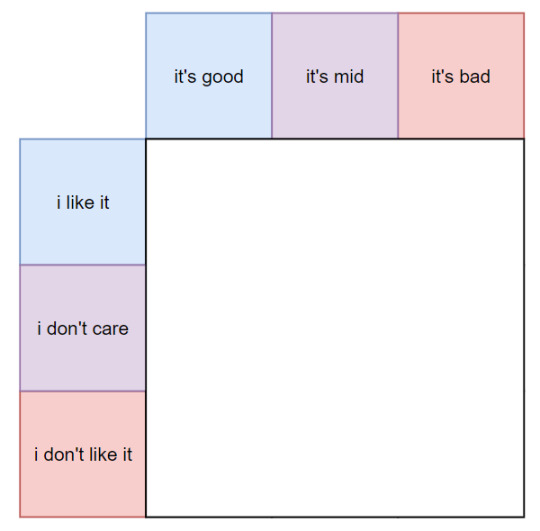
handy chart to have on hand when judging or recommending a thing
11K notes
·
View notes
Text
And if you like that, wait until you see what we've got up our sleeves next.
Everyone wanted their Cyberrats to smooch anyway, so we put rules in for it
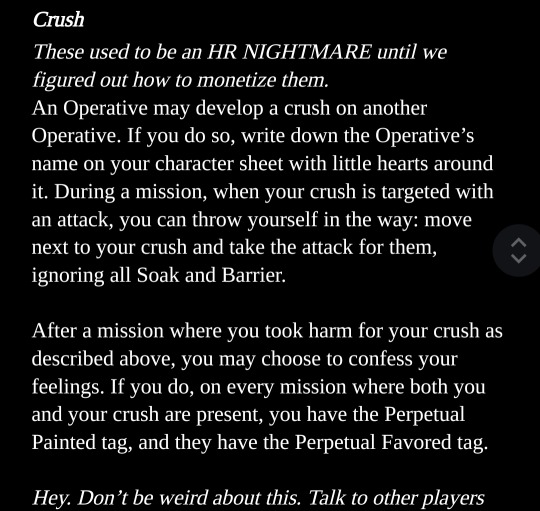
2 notes
·
View notes
Text
Everyone wanted their Cyberrats to smooch anyway, so we put rules in for it

#cyberrats#romance#ttrpg#ttrpg design#ttrpg dev#rpg#crush#furries would like this game but only if their fursonas are rats and also they want those rats to be cartoon super heros#furry#sfw furry#furry oc#furry fandom#furries#rats#ratposting#cyberpunk#roleplay#roleplaying
2 notes
·
View notes
Note
Yknow i love fo4 and fo76 as games but hate them as Fallout games yknow?
Like theyre nice to play and i love some of the characters but man. They just. Are not Fallout. Its literally like if you took Fallout but made it for a general audience, theres no spice!! Theres no grime!! Why is everything so clean!!!
That's the thing; these games are built with inherently different base goals in mind. Bethesda in the modern day thrives off selling the idea of player empowerment, of being an explorer in a foreign land that you conquer through hard work. You shape the world to your liking by questing and exploring and conquering. And genuinely? I got no problem with that. I think games that gas the player up like crazy and set you loose on a world to make it your own are totally fine conceptually! Like, the fantasy of being able to shape the world the way you see fit is something I think a lot of people can get into, whether you're just looking for control in your life or you just want the experience of feeling like you can have some grand effect on the world at large.
But because of that, I think the core of what makes Fallout so interesting has to be put on the backburner. I don't play Fallout to feel powerful necessarily, and I certainly don't play it for the fuckin' gunplay. I play it because it has such a fun dedication to weird stories that feel like they have something to say, a staff of writers dedicating their time and effort to being a proto-DM at a table, trying to provide interesting and thought-provoking or at least real damn fun stories in front of you, because ultimately, the West Coast Fallout games are about people. They're about characters! And when you focus less on the idea of telling stories in a world and more on empowering the player as a fourth-wall observer, those priorities clash and in the East Coast Fallout's cases, it makes for a game with no spice or edge. Having something to say about, say, the US Military or American Expansionism and Exceptionalism or the nature of clinging to the past kind of fundamentally clashes with the player empowerment fantasy that Bethesda Fallout games want to sell you. You can't have these philosophy-based, morally-interesting factional conflicts that want the player to look inward when the very concept of your game is built around collecting loot and shooting guys instead of learning about that loot and learning about those guys you're shooting and why you're shooting at each other. Having radiant quest loot loop gameplay just doesn't mesh well with a world where choices are meant to have far-reaching impact, because if it did, it'd be impossible to program under a normal development timeframe, and it would likely make the player look inward and go "what the fuck am I doing with my time?" at the endless meaningless quests to go on.
I don't think the "Lone Wanderer Comes Across A Microcosm Of Adventure" format is bad, not at all, but you have to put a lot of work to make that feel cohesive with the larger character and faction-based narratives that 1, 2, and NV are built on, so instead those Bethesda-style games opt more for a toybox, playground approach to the post apocalypse. And when your primary goal is showing the player how cool of a sandcastle they can build, it'll never be structurally sound enough to sustain even a wave of nuance.
456 notes
·
View notes

